This Rio Restaurant Feeds the Homeless, but Soup Kitchen It Is Not
The basic concept behind Refettorio Gastromotiva is simple: feed Rio de Janeiro’s homeless population with surplus food.
This Rio Restaurant Feeds the Homeless, but Soup Kitchen It Is Not
The basic concept behind Refettorio Gastromotiva is simple: feed Rio de Janeiro’s homeless population with surplus food.
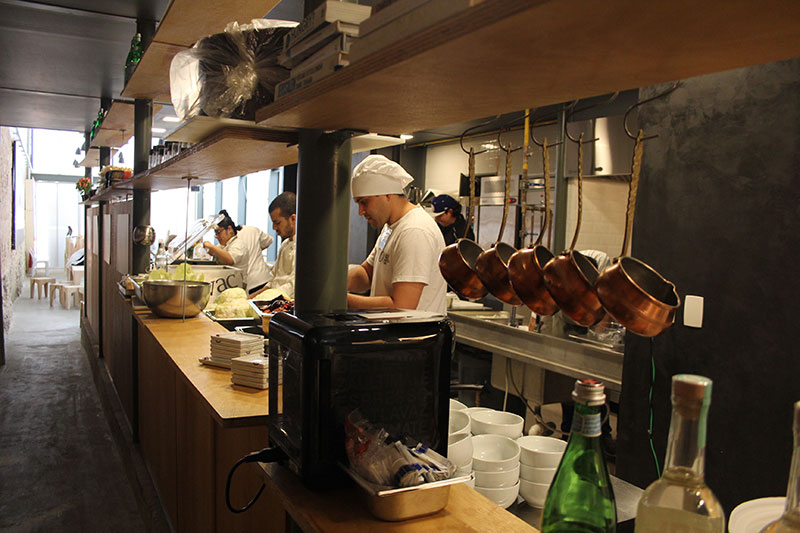
In the front of the house, volunteers wander to and fro, harried people jab their phones, and a Telemundo TV crew jockeys for a few minutes with Bottura and David Hertz, the Brazilian chef and social entrepreneur who represents the other half of the brains behind the place. Outside, a generator outside throws off diesel fumes and a hellish racket, while construction workers tear apart the sidewalk to – Bottura and Hertz desperately hope – fix some issue with the kitchen’s gas supply. It’s one of a million little problems this little restaurant has faced, but Refettorio Gastromotiva is the little restaurant that could.
“This place is a miracle,” says Cristina Reni, who works for Bottura’s Italian nonprofit, Food for Soul, which – along with Hertz’s organization, Gastromotiva and journalist Alexandra Forbes – is the force behind the restaurant. “Everyone said ‘No’ to us in the beginning.”
The basic concept behind Refettorio Gastromotiva during the 2016 Olympics is simple: feed Rio de Janeiro’s homeless population – which is estimated at 5,500 – with surplus food. We’re not talking about leftovers. This is food that would otherwise be wasted; stuff that’s ugly or bruised or approaching expiration, from sources including one of the main caterers at the Olympic Village. It’s a two-birds-with-one-stone kind of solution: There are the hungry among us, yet somewhere around one-third of the world’s food gets trashed.
Actually pulling the restaurant off, however – in the eight short months from conceptualization to grand opening on August 9 – was definitely not simple. Construction, in what was a decaying square in Rio’s Lapa neighborhood, happened in just 55 days (not counting ongoing tweaks). The frazzled vibe is understandable. Don’t even get the organizers started on the logistical wrangling – food suppliers, city hall, legal technicalities, the Rio 2016 marketing apparatus – that preceded the opening of what looks like a plain old high-concept restaurant but is actually a whole lot more.
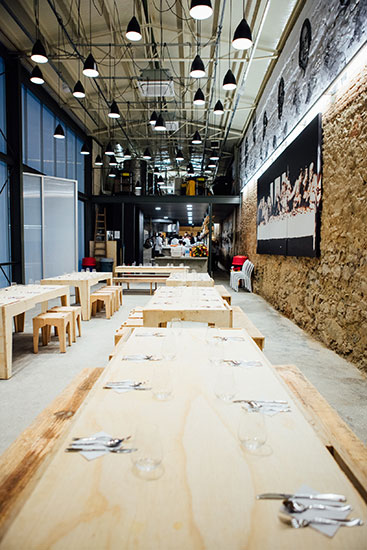
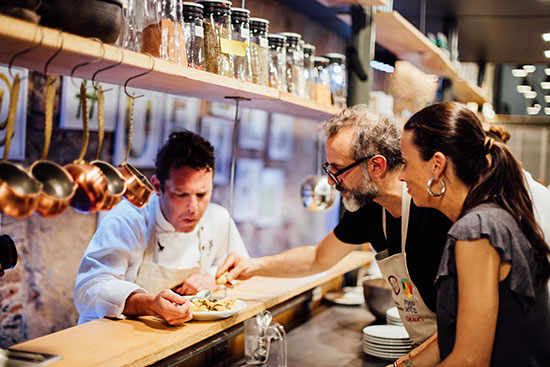
“We want to rebuild dignity,” says Bottura, who credits the influence of Pope Francis with his foray in to social justice.
That means the patrons – up to 108 of them each night, who live in Rio’s streets and shelters – are treated with table service instead of plastic trays and a chow line, there’s art hanging on the walls, and the food is prepared by a different name-brand chef each night as if they were in their own restaurants. For tonight’s main course, Jorge Vallejo from Mexico City’s Quintonil is working up a light molé. The kitchen staff working under the guest chefs are students in the vocational training program offered by Gastromotiva. In 2015 during the World’s Fair, Bottura ran a similar project, Refettorio Ambrosiano, in an abandoned theater on the outskirts of Milan where a rotating cast of chefs turned surplus food from an expo grocery store into meals for the needy. One of the participating chefs was Hertz, who called Bottura up last December and talked him into partnering on something similar in Rio.
Hertz’s ambitions for Refettorio Gastromotiva stretch well beyond the Olympics’ closing ceremony on August 21. After the world moves on to other things, the communal kitchen and school (Hertz’s mouthful of a term) get drawn into Gastromotiva’s larger “social-gastronomic movement.” Its core is the program’s four-month training program, offered for free to students from poor communities in several Brazilian cities, and it’s designed to develop new technical kitchen skills, self-esteem, and general life prospects that may otherwise have seemed out of reach. About 2,500 people have graduated since Hertz founded the program in 2007.
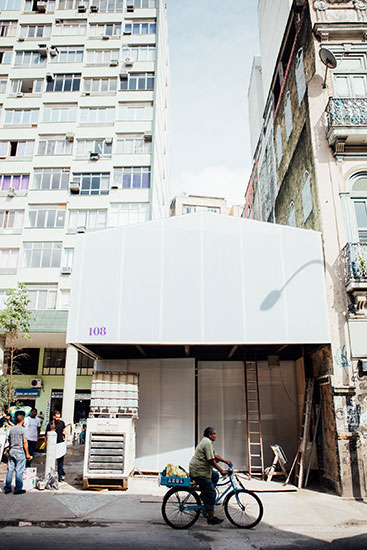
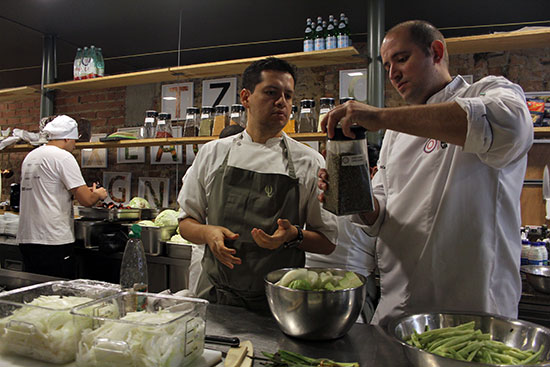
After the Olympics, Gastromotiva will keep the Rio restaurant open, using it as a new training facility for its students. They’ll serve lunch to paying customers at lunchtime; they’ll use that money to underwrite free dinners – made with surplus food – for the same needy patrons who are eating there during the Olympics.
“This is social change through food,” says Hertz, whose ideas have landed him recognitions like a TED fellowship and a Young Global Leader nod from the World Economic Forum.
When people talk about Olympic legacy projects, it’s usually about subway lines and stadiums and bobsled chutes and other things unlikely to deliver much material benefit to the neediest residents of the Olympic cities. If all goes as planned, Refettorio Gastromotiva will be Rio 2016’s salt of the earth legacy, where the hungry find food and the young staff discover new horizons.
There is precedent. The restaurant that Bottura et. al set up in Milan is still open, managed by a new community organization that hosts events and puts out free food for those who need it with surplus from a grocery store.
The afternoon is wearing on. Hertz looks at his phone in despair. New problems are flaring up. Pulling off a visionary, innovative concept like Refettorio Gastormotiva isn’t all that glamorous down in the trenches. Hertz says he’s exhausted., but he says he loves what he does.
The generator outside kicks it up a notch. The gas-repair project does not appear to be finished. Tonight’s guests arrive in a few short hours. Hertz fades off into the bustle. There is much yet to be done.
Follow us

This work is licensed under a Creative Commons Attribution-NoDerivatives 4.0 International License.
Want to republish a Modern Farmer story?
We are happy for Modern Farmer stories to be shared, and encourage you to republish our articles for your audience. When doing so, we ask that you follow these guidelines:
Please credit us and our writers
For the author byline, please use “Author Name, Modern Farmer.” At the top of our stories, if on the web, please include this text and link: “This story was originally published by Modern Farmer.”
Please make sure to include a link back to either our home page or the article URL.
At the bottom of the story, please include the following text:
“Modern Farmer is a nonprofit initiative dedicated to raising awareness and catalyzing action at the intersection of food, agriculture, and society. Read more at <link>Modern Farmer</link>.”
Use our widget
We’d like to be able to track our stories, so we ask that if you republish our content, you do so using our widget (located on the left hand side of the article). The HTML code has a built-in tracker that tells us the data and domain where the story was published, as well as view counts.
Check the image requirements
It’s your responsibility to confirm you're licensed to republish images in our articles. Some images, such as those from commercial providers, don't allow their images to be republished without permission or payment. Copyright terms are generally listed in the image caption and attribution. You are welcome to omit our images or substitute with your own. Charts and interactive graphics follow the same rules.
Don’t change too much. Or, ask us first.
Articles must be republished in their entirety. It’s okay to change references to time (“today” to “yesterday”) or location (“Iowa City, IA” to “here”). But please keep everything else the same.
If you feel strongly that a more material edit needs to be made, get in touch with us at [email protected]. We’re happy to discuss it with the original author, but we must have prior approval for changes before publication.
Special cases
Extracts. You may run the first few lines or paragraphs of the article and then say: “Read the full article at Modern Farmer” with a link back to the original article.
Quotes. You may quote authors provided you include a link back to the article URL.
Translations. These require writer approval. To inquire about translation of a Modern Farmer article, contact us at [email protected]
Signed consent / copyright release forms. These are not required, provided you are following these guidelines.
Print. Articles can be republished in print under these same rules, with the exception that you do not need to include the links.
Tag us
When sharing the story on social media, please tag us using the following: - Twitter (@ModFarm) - Facebook (@ModernFarmerMedia) - Instagram (@modfarm)
Use our content respectfully
Modern Farmer is a nonprofit and as such we share our content for free and in good faith in order to reach new audiences. Respectfully,
No selling ads against our stories. It’s okay to put our stories on pages with ads.
Don’t republish our material wholesale, or automatically; you need to select stories to be republished individually.
You have no rights to sell, license, syndicate, or otherwise represent yourself as the authorized owner of our material to any third parties. This means that you cannot actively publish or submit our work for syndication to third party platforms or apps like Apple News or Google News. We understand that publishers cannot fully control when certain third parties automatically summarize or crawl content from publishers’ own sites.
Keep in touch
We want to hear from you if you love Modern Farmer content, have a collaboration idea, or anything else to share. As a nonprofit outlet, we work in service of our community and are always open to comments, feedback, and ideas. Contact us at [email protected].by Andrew Jenner, Modern Farmer
August 15, 2016
Modern Farmer Weekly
Solutions Hub
Innovations, ideas and inspiration. Actionable solutions for a resilient food system.
ExploreExplore other topics
Share With Us
We want to hear from Modern Farmer readers who have thoughtful commentary, actionable solutions, or helpful ideas to share.
SubmitNecessary cookies are absolutely essential for the website to function properly. This category only includes cookies that ensures basic functionalities and security features of the website. These cookies do not store any personal information.
Any cookies that may not be particularly necessary for the website to function and are used specifically to collect user personal data via analytics, ads, other embedded contents are termed as non-necessary cookies.